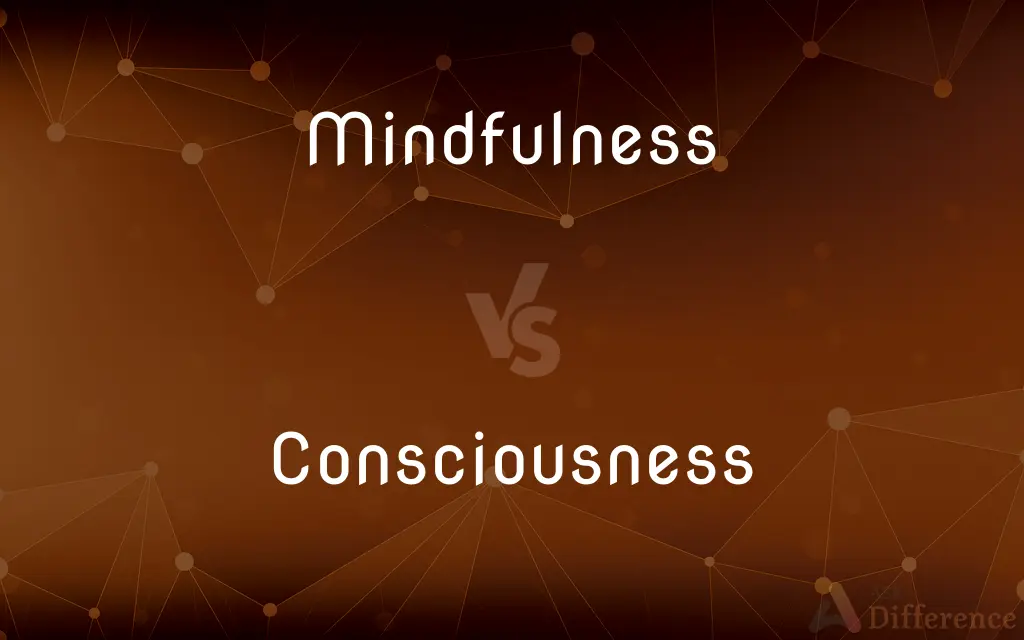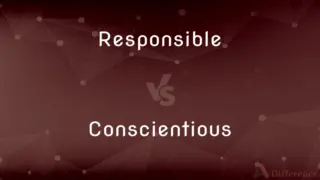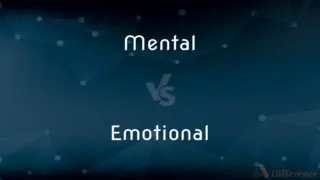Mindfulness vs. Consciousness — What's the Difference?
By Tayyaba Rehman — Updated on September 22, 2023
Mindfulness is focused awareness of the present moment. Consciousness is the general state of being aware and perceptive. Both relate to awareness, but with different depths and scopes.

Difference Between Mindfulness and Consciousness
Table of Contents
ADVERTISEMENT
Key Differences
Mindfulness pertains to the intentional, present-centered focus on one's thoughts, emotions, and sensations. It's a cultivated practice, often linked with meditation, where one seeks to be fully engaged in the here and now. Consciousness, meanwhile, is a broader term, denoting the overall state of being awake, aware, and capable of thought, sensation, and perception.
While both Mindfulness and Consciousness center on awareness, their applications diverge. Mindfulness is often an active endeavor, a deliberate effort to center oneself in the current experience, devoid of judgment. Consciousness is more passive, a fundamental state of being, not necessarily tied to the present moment or cultivated intentionally.
It's feasible to be conscious without being mindful. For instance, one might be conscious and engaged in mindless activities or be lost in past memories or future anticipations. However, practicing Mindfulness ensures that one's consciousness is firmly anchored in the present, attentive to the ongoing experiences.
Mindfulness is often touted for its therapeutic benefits, helping individuals manage stress, anxiety, and other psychological challenges. Consciousness, while not a therapy in itself, is the foundation upon which cognitive functions and personal experiences are built, allowing for perception, sensation, and introspection.
In essence, while Consciousness is the overarching state of being aware and functional, Mindfulness is a specific, intentional mode of that awareness, firmly rooted in the present moment, fostering clarity and centeredness.
ADVERTISEMENT
Comparison Chart
Definition
Focused awareness of the present
General state of being aware and perceptive
Application
Active, intentional
Passive, inherent
Scope
Present moment
Broad, includes past, present, future
Relation to Time
Anchored in the now
Not necessarily tied to the present
Therapeutic Role
Used in therapy for stress, anxiety
Fundamental state allowing for cognitive functions and experiences
Compare with Definitions
Mindfulness
A cultivated awareness often linked with meditation.
He started his day with 10 minutes of Mindfulness meditation.
Consciousness
The totality of thoughts, perceptions, and sensations.
Dreams are a fascinating realm of Consciousness.
Mindfulness
Non-judgmental observation of one's experiences.
Practicing Mindfulness helped him observe his thoughts without getting entangled.
Consciousness
The essence of individual subjective experience.
Philosophers have long debated the nature of Consciousness.
Mindfulness
A tool to enhance clarity and reduce reactivity.
Mindfulness techniques helped her respond calmly in stressful situations.
Consciousness
The state of being awake and aware.
His Consciousness slowly returned after being sedated.
Mindfulness
Intentional presence in the moment.
Through Mindfulness, she learned to savor every bite of her meal.
Consciousness
Consciousness, at its simplest, is sentience or awareness of internal and external existence. Despite millennia of analyses, definitions, explanations and debates by philosophers and scientists, consciousness remains puzzling and controversial, being "at once the most familiar and [also the] most mysterious aspect of our lives".
Mindfulness
Active engagement with the present.
Mindfulness allowed her to truly listen during conversations.
Consciousness
The state of being aware of and responsive to one's surroundings
She failed to regain consciousness and died two days later
Mindfulness
Mindfulness is the practice of purposely bringing one's attention in the present moment without judgment, a skill one develops through meditation or other training. Mindfulness derives from sati, a significant element of Buddhist traditions, and based on Zen, Vipassanā, and Tibetan meditation techniques.
Consciousness
A person's awareness or perception of something
Her acute consciousness of Luke's presence
Mindfulness
Attentive; heedful
Always mindful of family responsibilities.
Consciousness
The state or condition of being conscious.
Mindfulness
Awareness.
Consciousness
A sense of one's personal or collective identity, including the attitudes, beliefs, and sensitivities held by or considered characteristic of an individual or group
Love of freedom runs deep in the national consciousness.
Mindfulness
Inclination to be mindful or aware.
Consciousness
Special awareness or sensitivity
Class consciousness.
Race consciousness.
Mindfulness
Paying attention on purpose, in the present moment, and non-judgementally.
Consciousness
Alertness to or concern for a particular issue or situation
A movement aimed at raising the general public's consciousness of social injustice.
Mindfulness
A form of secular meditation practice with roots in Buddhist meditation.
Consciousness
In psychoanalysis, the conscious.
Mindfulness
The trait of staying aware of (paying close attention to) your responsibilities
Consciousness
The state of being conscious or aware; awareness.
Consciousness
The state of being conscious; knowledge of one's own existence, condition, sensations, mental operations, acts, etc.
Consciousness is thus, on the one hand, the recognition by the mind or "ego" of its acts and affections; - in other words, the self-affirmation that certain modifications are known by me, and that these modifications are mine.
Consciousness
Immediate knowledge or perception of the presence of any object, state, or sensation. See the Note under Attention.
Annihilate the consciousness of the object, you annihilate the consciousness of the operation.
And, when the steamWhich overflowed the soul had passed away,A consciousness remained that it had left. . . . images and precious thoughtsThat shall not die, and can not be destroyed.
The consciousness of wrong brought with it the consciousness of weakness.
Consciousness
Feeling, persuasion, or expectation; esp., inward sense of guilt or innocence.
An honest mind is not in the power of a dishonest: to break its peace there must be some guilt or consciousness.
Consciousness
An alert cognitive state in which you are aware of yourself and your situation;
He lost consciousness
Consciousness
Having knowledge of;
He had no awareness of his mistakes
His sudden consciousness of the problem he faced
Their intelligence and general knowingness was impressive
Consciousness
The foundation of cognitive and experiential functions.
Despite being asleep, some level of Consciousness remained.
Consciousness
A continuum from alertness to unconsciousness.
Under anesthesia, a person's Consciousness is profoundly altered.
Common Curiosities
How does Mindfulness relate to stress reduction?
Mindfulness helps individuals become non-reactive, reducing stress by promoting calm and clarity.
What is the primary goal of Mindfulness?
The primary goal of Mindfulness is to cultivate present-moment awareness.
How is Consciousness different from being awake?
While being awake indicates alertness, Consciousness encompasses awareness, perceptions, and sensations.
Can one practice Mindfulness without meditating?
Yes, Mindfulness can be practiced in daily activities, not just during meditation.
What role does Consciousness play in cognition?
Consciousness provides the foundation for cognitive processes like thinking, perceiving, and introspecting.
Is Mindfulness a type of Consciousness?
Mindfulness is a specific, intentional mode of Consciousness focused on the present.
Can practicing Mindfulness improve mental health?
Yes, Mindfulness has been shown to benefit various aspects of mental health, including anxiety and depression.
Is being unconscious the opposite of Consciousness?
Being unconscious is a state where Consciousness is greatly diminished or absent.
How do dreams fit into the concept of Consciousness?
Dreams are a form of altered Consciousness, offering insights into subconscious realms.
Can animals practice Mindfulness?
While animals might exhibit present-centered awareness, human-defined Mindfulness involves intentional cultivation.
Is Consciousness only tied to the brain?
While the brain plays a central role, Consciousness is a complex interplay of cognition, perception, and awareness.
Share Your Discovery

Previous Comparison
Responsible vs. Conscientious
Next Comparison
Mental vs. EmotionalAuthor Spotlight
Written by
Tayyaba RehmanTayyaba Rehman is a distinguished writer, currently serving as a primary contributor to askdifference.com. As a researcher in semantics and etymology, Tayyaba's passion for the complexity of languages and their distinctions has found a perfect home on the platform. Tayyaba delves into the intricacies of language, distinguishing between commonly confused words and phrases, thereby providing clarity for readers worldwide.
















































